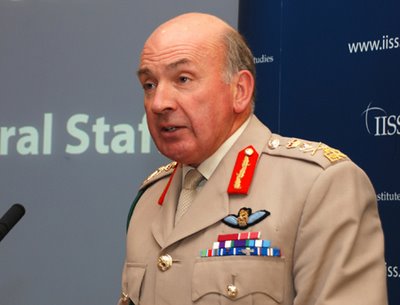Dannatt ain't a donut.
 (Apologies for the appalling title.)
(Apologies for the appalling title.)General Sir Richard Dannatt's speech yesterday to the Institute for Strategic Studies was notable for a number of reasons. Firstly, for his supreme honesty and refusal to generalise: when describing the "enemy" in both Iraq and Afghanistan he makes clear that the vast majority of those they are fighting/fought are not fanatical jihadists or Iranian-backed militants, but in the case of Iraq mostly nationalists and in Afghanistan, not simply the Taliban but "those who are fighting with the Taliban for financial, social and tribal reasons."
Secondly, he sets out only too clearly how all this is only a means to an end. Although he does include a "dark futures" section of the speech, he also recognises that the army increasingly needs to win the old chestnut of "hearts and minds", not just abroad, but also here at home. It's strange then that he can't quite bring himself to note that the very reason the army has lost support, if it has, as polls suggest that most of the public still is hugely supportive if not of the mission then of the men, is because as he himself put it last year, "we're exacerbating the security problems" and we should get out of southern Iraq very soon. A year later, we're still there, even if we've now withdrew to Basra airport. It also doesn't help when the army covers-up the abuse of Iraqi prisoners, either.
His suggestions for how we can show more appreciation are the weak link of the whole lecture. We've gone past the age of military parades, which we now more associate with "rogue states", and besides, apart from their return, there's no actual end as it were to the conflicts that they've returned from, making celebration about it doubly difficult. Dannatt's claim that the military is "the instrument of foreign policy conducted by a democratically elected Government acting in the name of the people" also isn't very convincing when Labour only earned the support of 22% of the population at the last general election, or indeed when it seems not just to the public, but also to the average Tommy Atkins that we're operating as a minor arm of American, rather than British foreign policy. It does however seem that we've got as a good a head of the army as we might conceivably have.
Labels: Army, Iraq, Iraq withdrawal, Richard Dannatt

